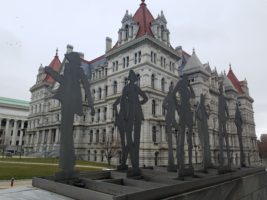 A pandemic is not the time to ease up on funding for health prevention programs, said the American Heart Association, and from Tuesday, May 27 through Friday, May 29, advocates from the American Heart Association will be phoning, emailing and tweeting elected state officials to remind them of that fact.
A pandemic is not the time to ease up on funding for health prevention programs, said the American Heart Association, and from Tuesday, May 27 through Friday, May 29, advocates from the American Heart Association will be phoning, emailing and tweeting elected state officials to remind them of that fact.
Some 50 advocates will be seeking to increase the cigarette tax by at least $1.00 per pack, and to maintain funding for the Obesity Prevention Program and the Hypertension Program.
Increasing the cigarette tax could serve two purposes, said Caitlin O’Brien, JD, New York State Government Relations Director for the American Heart Association, by reducing risk factors for heart disease and stroke, and bringing needed revenue to the state coffers.
“It’s critical that legislators focus on COVID-19 matters when they meet this week, but we are seeing that risk factors that lead to heart disease and stroke put people at higher risk for the virus,” said O’Brien. “Tobacco use remains the leading risk factor for heart disease and stroke, which is complicating COVID cases.
“Also, science shows that raising the price of cigarettes leads to people quitting this dangerous habit,” O’Brien said. “Kids especially are vulnerable to cost, and if smokers are thinking of quitting, an increase in price can be the determining factor for them. We last raised the cigarette tax 10 years ago, so smokers have acclimated to the price. An increase in the tax will lead to decreased smoking rates – and decreased health risks. Also, with roughly a $14 billion deficit in the state budget, this could put revenues back in state coffers while doing good public health work. It’s a win-win for New Yorkers.”
New York’s tax of $4.35 per pack of cigarettes makes it the highest state tax on cigarettes, but second to the cigarette tax in the District of Columbia. In New York City, tax on a pack of cigarettes is $5.85.
Heart Association advocates will also be asking legislators to be sure that funding for the Obesity Prevention Program and the Hypertension Program be at least maintained at $5.9 million and $692,000 respectively, as approved in the state budget. Gov. Cuomo gave himself the power to look back and make changes to authorized spending, and the American Heart Association wants legislators, who can disagree with any changes the governor might make, to keep the funding for these programs.
As with smoking, risk factors like an unhealthy weight, high blood pressure, and diabetes put people at a higher risk of COVID-19.
“The Obesity Prevention Program and the Hypertension Program address exactly those issues, and spending money on these programs now can save us money later,” O’Brien said. “We don’t want to shoot ourselves in the foot by not maintaining the funding for these programs. Prevention is key when it comes to chronic diseases, and these programs do that. If they are cut, they can’t operate as effectively.”
On Wednesday, American Heart Association advocates will be reaching out to state legislators. On Thursday, they will contact Gov. Andrew Cuomo’s office. And on Friday, they will take to social media to share their message.
To be part of the American heart Association’s Advocacy Week, email New York State Government Relations Director Caitlin O’Brien at Caitlin.Obrien@heart.org